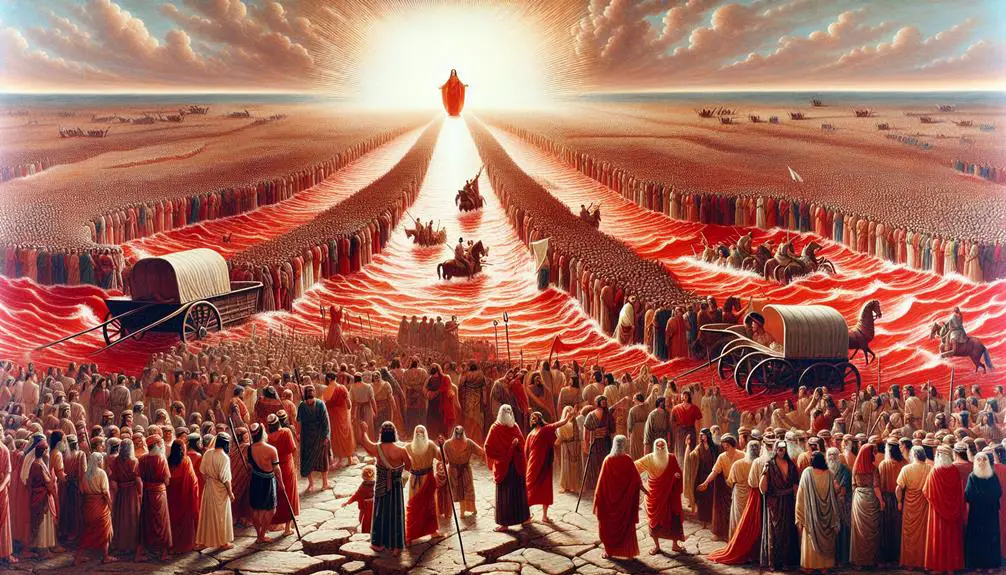Ponder the divine orchestration in biblical stories, where each twist of fate reveals a deeper purpose waiting to be uncovered.

Everything Happens for a Reason in the Bible
As you navigate through the intricate tapestry of stories woven into the Bible, you'll uncover a thread that binds them all: the belief that everything happens for a reason. From Joseph's unforeseen ascent to power in Egypt to Job's unwavering faith amid suffering, each narrative unfolds with a divine purpose at its core. Consider Esther, who found herself in a royal position 'for such a time as this,' or Jonah, whose detour inside a great fish redirected his mission.
These stories challenge you to ponder the unseen forces at play in your own life. What hidden threads might you discover if you look closely?
Key Takeaways
- Divine intervention in biblical stories demonstrates that every event serves a purpose within God's plan.
- Trials and adversities faced by biblical figures teach resilience and faith, revealing that challenges have reasons that foster spiritual growth.
- Leadership and guidance in biblical narratives underscore that positions of authority and difficult journeys are orchestrated for greater divine purposes.
- Prophecy and redemption in biblical events confirm that historical occurrences and individual actions align with God's overarching plan for humanity.
The Story of Joseph

In the narrative of Joseph, found in the Book of Genesis, we observe a profound example of how adversity and fortune intertwine, illustrating the biblical theme that everything happens for a reason. Joseph's story is a compelling narrative of dream interpretation and brotherly betrayal, embodying the complexities of human relationships and divine intervention. Initially, Joseph's ability to interpret dreams signifies his special favor with God, setting the stage for the unfolding of his destiny. However, this same gift fuels the jealousy of his brothers, leading to his betrayal and sale into slavery.
Analyzing the text, you'll find that Joseph's journey from the pit to the pinnacle of Egyptian society isn't just a tale of personal triumph but also a theological discourse on the sovereignty of God over human affairs. His eventual rise to power, culminating in the saving of Egypt and his own family from famine, is a testament to the idea that God's purposes prevail, even through the actions of those with ill intent. The brotherly betrayal, although a heinous act, becomes a vehicle through which Joseph is positioned to achieve greatness and fulfill his divine purpose.
This narrative teaches that adversity isn't an obstacle to God's plan but often a catalyst. Joseph's story, rich in the themes of dream interpretation and the consequences of envy, serves as a powerful example of how misfortune can lead to a greater destiny, reinforcing the biblical assertion that everything happens for a reason. Through scholarly analysis, one can glean that every aspect of Joseph's life, from his dreams to his unjust suffering, was intricately woven into the fabric of a larger divine plan.
Job's Trials and Faith

Much like Joseph, Job's narrative offers a profound exploration of faith amidst suffering, underscoring the biblical notion that everything happens for a reason. Job's trials aren't just a test of endurance but a testament to suffering's purpose and faith's resilience. You'll find his story not only compelling but also deeply instructive, revealing layers of meaning about human suffering and divine sovereignty.
The narrative of Job challenges you to consider:
- The nature of true faith: Job's faith isn't passive but is actively engaged with God, even in the depths of despair. It's a faith that questions, laments, and seeks understanding.
- The role of suffering in spiritual growth: Job's suffering strips away everything superficial, revealing a profound spiritual depth and resilience. His trials illuminate the complex relationship between suffering, faith, and character development.
- The sovereignty of God in human affairs: Job's story emphasizes that God's ways are beyond human understanding, yet there's a divine purpose in every event, no matter how painful.
- The importance of perseverance: Despite his immense losses and the absence of clear reasons for his sufferings, Job's perseverance in faith underscores the biblical theme of enduring faith amidst trials.
Job's narrative, with its intense exploration of suffering's purpose and faith's resilience, offers you a lens through which to view your own trials. It suggests that even when you're in the midst of suffering, there's a greater purpose at work, one that's deeply intertwined with the development of steadfast faith and spiritual maturity.
Esther's Divine Appointment

Esther's story unfolds as a divine appointment, where her ascent to queen becomes a pivotal moment for the survival of her people. Her journey from an ordinary Jewish girl to the queen of Persia exemplifies the intricate ways in which divine providence can operate through seemingly coincidental events. Esther's royal beauty, more than just a personal attribute, becomes a crucial element in her story, serving as the key that unlocks the door to her becoming queen. This aspect of her tale isn't merely about physical appearance but signifies the divine favor and the specific purpose for which she was positioned in the palace.
The Purim celebration, deeply rooted in Esther's narrative, commemorates the deliverance of the Jewish people from a decree of destruction. It serves as a yearly reminder of the unseen hand that guides events for the good of those who are called according to a divine purpose. Esther's role in this story isn't accidental but a clear demonstration of being at the right place at the right time, equipped with the right qualities, all orchestrated by a sovereign plan.
Analyzing Esther's story within the broader biblical context highlights a pattern where individuals are placed in positions of influence, not for their own aggrandizement but for a purpose far beyond themselves. Esther's divine appointment teaches that behind the facade of royal beauty and political intrigue lies a deeper narrative of divine intervention and purpose. It challenges you to see life's events, not as random occurrences but as part of a larger, divinely orchestrated plan.
Jonah's Reluctant Journey

Embarking on Jonah's reluctant journey reveals the profound tension between divine command and human free will, showcasing a pivotal moment of resistance and eventual submission within the biblical narrative. Jonah's story isn't just a tale of nautical disobedience but a profound repentance lesson, deeply woven into the fabric of human defiance against the divine.
Here, you're invited to delve deeper into the complexities of Jonah's journey, where disobedience meets divine intervention in a tale that transcends time.
- Divine Command vs. Human Will: Explore the clash between Jonah's personal desires and God's directive, illuminating the universal struggle between following our path or adhering to a higher calling.
- The Storm of Consequence: Understand how the storm at sea symbolizes the turmoil of running from divine responsibilities, highlighting the inevitable consequences of disobedience.
- Nautical Disobedience: Jonah's attempt to flee by sea serves as a metaphor for the futility of escaping divine plans, emphasizing how our efforts to avoid destiny often lead us directly into its jaws.
- Repentance Lesson: The heart of Jonah's story isn't his initial failure but his subsequent realization and repentance, offering a powerful message on the importance of acknowledging our mistakes and turning back towards the right path.
Jonah's journey from resistance to submission underlines a critical lesson: while we may attempt to flee our destined paths, true fulfillment and peace come from embracing, not avoiding, the divine will. Through Jonah's reluctant journey, we learn the transformative power of repentance and the profound truth that, indeed, everything happens for a reason.
The Exodus: Freedom's Path

You'll find that within the Exodus narrative, Moses' leadership isn't just about guiding the Israelites out of Egypt, but it's also a profound exploration of faith under pressure.
The plagues, often seen as divine signs, serve a dual purpose: demonstrating God's power and challenging the Egyptian gods.
This part of scripture invites you to consider how divine intervention and human agency intersect on the journey toward liberation.
Moses' Leadership Role
Moses' ascent to leadership, marked by the pivotal role he played in the Exodus, embodies a profound transformation from a reluctant shepherd to the emancipator of the Israelites. His journey offers invaluable insights into:
- The resilience required during desert wanderings.
- The importance of faith in uncertain times.
- Leadership lessons gleaned from guiding a nation to freedom.
- The strategic negotiation with Pharaoh, showcasing diplomatic acumen.
Analyzing Moses' leadership, you'll see it's interwoven with trials that tested and ultimately strengthened his faith and resolve. His story isn't just historical; it's a masterclass in overcoming adversity through perseverance, strategic thinking, and an unwavering belief in a higher purpose. Moses' legacy teaches us that leadership might be thrust upon us unexpectedly, demanding adaptability, foresight, and, above all, faith in one's path.
Plagues as Divine Signs
Amid the quest for freedom, the ten plagues stand as divine signs, each meticulously designed to challenge the Egyptian deities and affirm the Israelites' faith in their journey toward liberation. These events aren't just tales of divine punishment but also carry deep environmental impacts, revealing the interconnectedness of faith, nature, and society.
Plague |
Targeted Deity |
Environmental Impact |
|---|---|---|
Water to Blood |
Hapi (Nile God) |
Disruption of water supply |
Frogs |
Heket (Frog Goddess) |
Overpopulation & decay |
Lice |
Geb (Earth God) |
Soil degradation |
Flies |
Khepri (Creation) |
Disease spread |
Livestock Death |
Hathor (Sky Goddess) |
Economic ruin |
Each plague serves as a sign, intricately woven into the fabric of their liberation narrative, symbolizing not just the downfall of Egyptian polytheism but also highlighting the severe environmental repercussions of divine intervention.
David's Path to Kingship

David's path to kingship, intricately woven through the fabric of biblical narrative, exemplifies a divine orchestration of events and human agency. From his humble beginnings as a shepherd boy to becoming the king of Israel, each step on David's journey was marked by significant events that underscored both his divine appointment and his human struggles.
- Goliath Challenge: This pivotal moment showcased David's faith and courage, setting him apart as a leader in the eyes of the Israelites and laying the groundwork for his rise to power.
- Saul's Jealousy: Saul's increasing jealousy and subsequent attempts on David's life highlight the human complexities in David's path, illustrating how personal animosities can shape the course of one's destiny.
- Divine Anointing: Samuel's anointing of David, while he was still a young shepherd, symbolizes the divine choice of leadership, emphasizing that God's plans often transcend human expectations.
- Public Acclaim: David's growing popularity among the people, stemming from his military successes and charismatic leadership, contributed to his eventual ascent to the throne, illustrating the interplay between divine favor and public support.
These elements collectively paint a picture of a path to kingship that was neither straightforward nor unchallenged. David's journey was fraught with obstacles, both external and internal, yet it was precisely these challenges that prepared him for the role of a king. Through the Goliath challenge and Saul's jealousy, we see a narrative that underscores the complexity of human relationships and divine intervention, highlighting the multifaceted nature of David's ascent to kingship.
Paul's Transformation

Paul's transformation from a fervent persecutor of Christians to a foundational apostle of Christianity epitomizes the profound impact of divine intervention on human lives. This metamorphosis unfolds on the Damascus road, where Paul, initially Saul, encounters a grace so overwhelming it reroutes his entire existence. This grace encounter isn't merely a change of heart; it's a total recalibration of purpose, vision, and identity.
Aspect |
Before Encounter |
After Encounter |
|---|---|---|
Identity |
Persecutor |
Apostle |
Mission |
Destroy Christianity |
Spread Christianity |
Understanding |
Legalistic Zeal |
Grace-Filled Faith |
Vision |
Earthly Power |
Divine Commission |
Paul's experience on the Damascus road serves as a pivotal moment in biblical history, showcasing the transformative power of direct divine intervention. Prior, Paul's dedication to eradicating the Christian faith was unwavering. Post encounter, he becomes its most ardent promoter, authoring significant portions of the New Testament and establishing foundational Christian doctrines.
Analyzing this transformation, it's essential to recognize the role of divine grace as a catalyst for change. Paul's journey from persecutor to apostle illustrates not only the possibility of radical transformation but also the expansive reach of divine grace. This grace encounter doesn't simply adjust Paul's trajectory; it revolutionizes his entire understanding of faith, moving from a legalistic interpretation of religion to a relationship-based faith centered on grace and redemption.
Paul's transformation underscores a core biblical theme: divine purposes often unfold in unexpected ways, with transformative encounters reshaping lives and destinies.
Jesus' Crucifixion and Purpose

Just as Paul's encounter on the Damascus road represents a pivotal moment of transformation, the crucifixion of Jesus stands as a cornerstone event, embodying the ultimate expression of divine purpose and sacrifice. This act wasn't merely a tragic end but a fulfillment of divine prophecy, intricately woven into the fabric of biblical narrative to underscore the profound theme of sin redemption.
You must understand the multifaceted implications of this event:
- Fulfillment of Prophecy: Jesus' death was foretold by prophets, underscoring the meticulous unfolding of God's plan.
- Sin Redemption: It represents the ultimate sacrifice for humanity's sins, offering a pathway to reconciliation with God.
- Divine Love Manifested: The crucifixion illustrates the depth of God's love, willing to endure immense suffering for humanity's sake.
- Eternal Life: Through Jesus' death and resurrection, believers are offered the promise of eternal life, transcending the power of sin and death.
Analyzing Jesus' crucifixion through a scholarly lens, you'll discover its intricate ties to Old Testament prophecies and its pivotal role in the New Testament's narrative arc. This wasn't an arbitrary event but a deliberate act within God's redemptive plan, showcasing His sovereignty and the interplay between divine foreknowledge and human history.
In essence, Jesus' crucifixion encapsulates the heart of Christian doctrine, presenting a vivid tableau of sacrifice, love, and hope. It invites you to delve deeper into the complexities of biblical themes, encouraging a nuanced understanding of sin redemption and the fulfillment of divine prophecy. Through this lens, you grasp the profound theological implications and the transformative power of this seminal event.
Frequently Asked Questions
How Do Modern Theologians Reconcile the Concept of "Everything Happens for a Reason" With the Presence of Evil and Suffering in the World?
You're diving into how modern theologians tackle reconciling the idea that everything happens for a reason with the existence of evil and suffering.
They lean on the concept of divine mystery, suggesting that not all can be understood or explained.
It's believed that suffering plays a role in moral development, pushing individuals towards growth and empathy.
This view seeks to provide a framework for understanding life's challenges without dismissing the pain they cause.
Are There Examples in the Bible Where Events Occur That Do Not Seem to Have a Clear Purpose or Reason, and How Are These Interpreted?
You'll find intriguing examples like Job's suffering and Joseph's ascent in the Bible, where events initially seem without clear purpose. Job's ordeal appears senseless, yet it unfolds deeper themes of faith and endurance.
Similarly, Joseph's journey from betrayal to a high position in Egypt demonstrates how adversity can lead to unforeseen benefits. These stories are interpreted as showing that what seems purposeless may have profound implications, challenging the surface understanding of events.
How Does the Concept of Free Will Fit Into the Belief That Everything Happens for a Reason, According to Biblical Teachings?
You're delving into how free will and the belief that everything happens for a reason coexist in biblical teachings. This intertwines deterministic theology with the choice paradox. Essentially, scripture suggests a balance—God's sovereignty orchestrates events, yet humans possess free will to make choices.
This duality doesn't contradict but rather complements, highlighting a complex, divine plan where freedom and predestination coalesce, offering a nuanced understanding of faith and accountability in one's actions.
Can the Idea That "Everything Happens for a Reason" Be Applied to Non-Biblical Historical Events, and if So, How Do Scholars Approach This?
You're diving into whether 'everything happens for a reason' applies outside biblical events. Scholars often explore this through historical determinism and cultural interpretation.
They analyze past events, seeking patterns and causes, suggesting that societal developments mightn't be random but influenced by preceding actions or beliefs. This approach doesn't negate free will but provides a framework for understanding historical progressions, showing how cultural contexts shape interpretations of events and their perceived reasons.
How Do Different Denominations Within Christianity View the Concept of "Everything Happens for a Reason," and Are There Significant Differences in Interpretation?
You're navigating a maze of interpretations when exploring how different Christian denominations view 'everything happens for a reason.'
This belief intricately ties to debates on divine intervention and predestination. Some see it as God's direct influence, while others argue for a more nuanced understanding.
These significant differences reflect the depth of theological discourse, highlighting how scholars dissect and reconcile these views within the broader Christian faith.
Conclusion
In weaving the tapestry of existence, every thread serves its divine purpose, as illustrated through biblical narratives. Joseph's pit, Job's ashes, Esther's crown, Jonah's whale, Moses' sea, David's sling, Paul's chains, and Jesus' cross symbolize life's transformative adversities.
These stories collectively underscore a foundational truth: adversity molds destiny. Like a potter shapes clay, life's challenges forge our divine purpose. Thus, in the grand design, each trial and triumph isn't mere happenstance but a meticulously crafted stroke in the masterpiece of existence.



Sign up